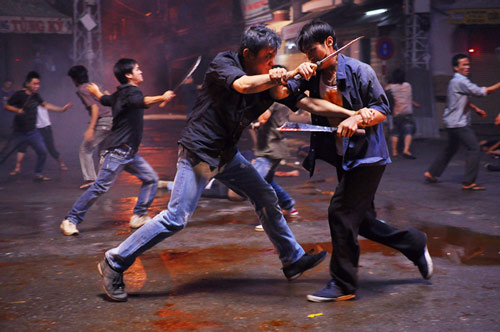Thuy Linh gives us an in-depth review of several Vietnamese filmmakers and their approach to making action films- what holds the stories together, what each film lacks, and how to enhance the audience’s experience.
Have you subscribed to diaCRITICS yet? Subscribe and win prizes! Read more details.

I enjoyed the four Vietnamese movies screened during Tet (Lunar New Year festival), but it isn’t because they are good. It’s because local filmmakers seem to be improving: the stories are getting coherent. Of the four films, My nhan ke (The Lady Assassin) and Bay vao coi mong (Fly into a Dream) are more coherent. Both of them have martial arts/action elements and what hold their stories together are the fights.
This makes me think that it may be good for local filmmakers to try their hands with martial arts/action movies at the moment. In a previous column, I mentioned another genre, the historical film. Both genres are advisable. In fact, some recent movies are a mix of these genres. But to further develop these genres, thoughtful filmmakers should explore historical material in a serious way, and entertainment-minded directors can go for pure martial arts/action.
As they are still weak at scripting, local filmmakers may feel more comfortable coming up with martial arts/action stories, whose characters don’t have to be complex. Many local filmmakers’ favorite films are martial arts/action anyway, so they shouldn’t try to oblige audiences with movies that as an audience, they wouldn’t watch, like silly romance comedies.

I’m glad Charlie Nguyen’s upcoming movie is an action flick about Saigon gangsters. This type of movies seems closer to his heart than romance comedy. His best movie so far is still the martial arts hit Dong mau anh hung (The Rebel), not his recent high-grossing romantic comedies. Luu Huynh’s most watchable movie, in my opinion, is also his martial arts movie, Huyen thoai bat tu (The Legend is Alive), not Ao lua Ha Dong (The White Silk Dress) or Lay chong nguoi ta (In the Name of Love), which strike me as phony melodramas.
The same thing can be said about Victor Vu. It is Thien menh anh hung (Blood Letter), a martial arts action fantasy, that shows him at his best, not Giao lo dinh menh (Inferno) or Scandal, of the psychological thriller/crime/horror hybrid, which I found forced and pretentious.

However, if local filmmakers continue to develop the martial arts/action genre, there are two things to bear in mind. One is that they don’t have to apologize for the “action” in their movies, as long as the violence isn’t gratuitous. Action movies are about action. I say this because in Huyen thoai bat tu, our hero’s mother teaches him that he should only use violence as a last resort. Luu Huynh seems to interpret this moral literally and as a result, made a movie that has too little action or action that is too boring. Thien menh anh hung more skillfully weaves action with the film’s overall message about forgiveness and non-violence. In this movie, the most powerful technique of martial arts has more to do with the hero’s personal growth than his physical strength.
Compared to the other two, Charlie Nguyen’s Dong mau anh hung doesn’t apologize as much. It’s a straightforward movie about Vietnamese who use their fighting skills to beat the French colonists. But again, the end, which in this case is Vietnam’s independence, is righteous and justifies the means.

Local filmmakers should ponder the essence of the action genre. If they don’t believe in the basis of what they are selling to audiences, they should make more serious movies. If they do, then treat action, and all “commercial” cinema for that matter, as serious works, and stop making fluff, like Nguyen Quang Dung’s My nhan ke, and stop being cynical, which leads to movies that are neither entertaining nor artistic, like Victor Vu’s Scandal. If they really believe in the need for action, they should make robust action movies that don’t have to resort to romance or sex to make the movie more interesting.
Another thing is the common taste for a sad, muted look in many local movies, including martial arts/action films. The use of colors such as brown, which has a cultural and nationalistic overtone, may work for films such as Thien menh anh hung, which is based on the tragic life of national icon Nguyen Trai (1380-1442) and whose hero is brought up as a Buddhist monk. But if one movie after another uses the same type of colors, it shows a lack of creativity.

One foreign expert told me that the common use of muted colors in Vietnamese movies make them look like they were made years ago. The unofficial trailer of Charlie Nguyen’s upcoming movie about Saigon gangsters look quite dark. But the dark settings and muted colors may be justified because this is supposed to be a gritty story about gangsters who, as we know, operate at night (at least in the movies).
We’ll see once the film comes out. VW
[Caption: Scenes from Bui doi Cho Lon, Charlie Nguyen’s upcoming action movie about Saigon gangsters. The film premiered April 19, 2013.
PHOTOS FROM THE MOVIE’S FACEBOOK PAGE.]
Thuy Linh lives and works in Hanoi. She graduated from UMass Boston with a BA in English and has a Certificate in Screenwriting from the Film Studies Program, a 10-month program of the Hanoi University of Social Sciences and Humanities (in partnership with the Ford Foundation).
She is a translator/reporter/editor for various English newspapers in Hanoi and HCMC such as VietNamNet, Saigon Times, Sai Gon Giai Phong, and Tuoi Tre. At present, she works as a translator/editor for the “fiction” section (translates and edits contemporary Vietnamese short stories) and a film critic for Thanh Nien. This article originally appeared in Thanh Nien.
Do you enjoy reading diaCRITICS? Then please consider subscribing!
Please take the time to rate this post (above) and share it (below). Ratings for top posts are listed on the sidebar. Sharing (on email, Facebook, etc.) helps spread the word about diaCRITICS. And join the conversation and leave a comment! What do you think of Thuy Linh’s take on Vietnamese action films? Have you seen any of these films yet? Tell us what you think! We want to know!




nice post
My Vietnamese is too basic to really seek out more intellectual reviews of locally made films, so I was grateful to find your reviews on this site, but I have to say we have completely different tastes and perspectives. In one article you talk about how overseas directors who make films about Vietnam often portray Vietnamese culture and people through a superficial lens, using hackneyed cultural symbols that are empty underneath the surface. While you’re not incorrect, I also feel like you yourself look at Vietnamese films through a foreign hipster (for lack of a better word) critic’s eyes (probably influenced by your years as a student in the U.S.). I also feel like, as usual, people expect way too much. Like in one article where you bemoan how Vietnamese cinema’s quality is “falling behind” Thailand’s. I mean, seriously? Isn’t Vietnam’s GDP per capita 1/3 of Thailand’s? And money is everything because basically Thailand’s film industry was at a similar stage of development ages ago.